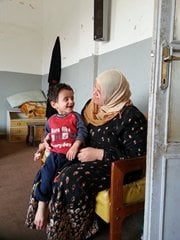
At the end of the discussion, a lady, making sure all the participants had left the room, approached us, shyly. She asked “are you going to talk about violence happening at home?”. The social worker’s response was affirmative, as that was the main purpose of the psychosocial support sessions for Syrian displaced women and girls in Lebanon. “I have a situation, but I cannot talk about it in front of the other ladies, because they will know about it and it will no longer be a safe secret”.
The secret-bearer is a 39 years old Syrian displaced. Her name is Wiam. She got married at 18 and had her first baby 9 months later. She fled her home in Homs 18 months ago, due to the fighting. She is currently residing with a Lebanese host family in Bani Sakher, a small village in North Lebanon.
Wiam has been subject to domestic violence by her husband, in its various forms. Wiam’s story is no exception. A UNFPA needs assessment in 2012 showed that 7% of Syrian displaced women had suffered sexual aggression and that 21% of women reported having a female family member slapped or hit. International Rescue Committee’s assessment in 2012 identified intimate partner violence, early marriage and survival sex as other forms of violence experienced by women and girls since arriving in Lebanon.
Violence is not new to Wiam. It has been present since she first married. It is not the result of her displacement to Lebanon, but violence has increased since, and it is now taking various new forms. “He hits me often with anything at hand, his shoes, his belt, a dish”. When I ask him why, he says: “if you are not happy, the door is wide open, I can divorce you and you can go back to your parents”. She adds: “such things can be said to his girlfriend, but to me? the mother of his children!?”. Her eyes fill of tears, she continues “Recently, he returned to Syria for four days to work, he left me with only 30,000 Lebanese Pounds (equivalent of 20 USD), and when he came back, he hit me hard because I had spent them all! How was I supposed to feed the five children?! A mere mankousheh and a Bonjus cost 2,000 L.P!!”. “Anyhow, I cannot even ask for money to buy medication for myself”…
In cases like Wiam’s, providing psychosocial support and equipping women with coping mechanisms can be one of the best ways to ensure the health, security and well-being of families and entire communities. In 2013, and with the support of UNFPA Lebanon, more than 3700 women and girls benefitted from awareness raising Gender Based Violence and more than 800 women and girls were provided with psychological support with focus on Gender based violence and parenting strategies.
PS: “This photo does not relate to the actual story for security and privacy purposes”

